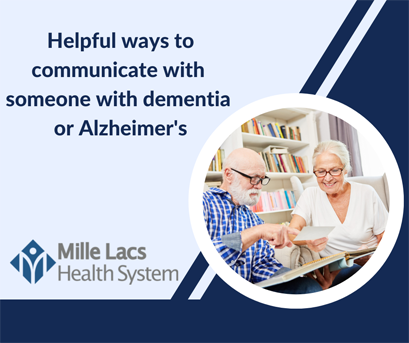Communicating with someone who has dementia or Alzheimer’s
February 23, 2023
People with Alzheimer’s and dementia live with brain damage that affects their thought processes, memory, and behavior. While their behavior can be upsetting and frustrating for you, it's even worse for them.
The key to more positive interactions with individuals with Alzheimer’s, is to understand a person’s abilities and limitations and then adjust your words, actions, and expectations accordingly. When a person gets Alzheimer’s or dementia, everyone has to learn to be flexible because the individual can’t be.
Here are five tips for positively engaging with individuals suffering from Alzheimer’s or age-related cognitive decline:
- Affirm their reality – When a person’s version of what’s going on is not real, trying to force reality often causes confusion or embarrassment. Instead of correcting the person’s take on reality, repeat his or her words back to affirm that you have heard what is being said even if you don’t agree. Your best response is: “It sounds like…” or “What I hear you saying is…”
- Acknowledge emotion – If a person is angry, upset, or irritated about something, show that you think the emotion is legitimate. Your words can make a difference by acknowledging that you understand how the person feels. Your best response is: “I’m sorry you feel that way…” or “That shouldn’t have happened…”
- Don’t be specific in your ask – Frustration results when an individual can’t find the words to answer your question. Guide the conversation by saying: “Tell me more about it…” or “What are you thinking?”
- Adjust your tone – Deepen your voice, use a questioning tone, and add emotion or pauses to your dialogue to grab the person’s attention. Repeating yourself and getting louder only increases agitation.
- Promote engagement – Focus on discussion topics and activities that the person still cares about. When people feel accepted and understood, they are less anxious.
Being flexible in how you respond to a person's thoughts, words, and actions can improve interactions with those you love and will likely make your time together happier, and more positive overall.
If you or your loved one is interested in learning more about how Mille Lacs Health System can meet the care needs of your family member suffering from Alzheimer’s or dementia, please reach out to Nancy Lundquist, Social Worker at 320-532-2742. Mille Lacs Health System is able to offer Long Term Care memory support for Alzheimer’s or Dementia. Additional services on the Onamia campus include a licensed assisted living facility, where your loved one can receive assistance with meals, medications, and activities of daily living.
